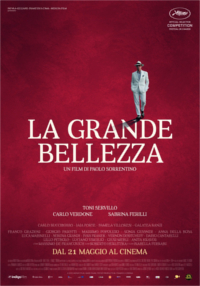La Dolce Vita: Sorrentino Visits Rome & Fellini in Opus-like Stroke
In Paolo Sorrentino’s lavishly received Italian crime potboiler Il Divo, the stage is set with a world building montage that places us in a blood-bathed Rome ruled by politically backed hit men, and finally settles in, dollies up, and asks it’s leading man, Toni Servillo giving his best dead-eyed Giulio Andreotti impression, to stare straight into the camera and speak directly on how others seem to perceive him. Bizarrely, The Great Beauty begins almost the exact same way, but this version of Rome is not one of physical violence and political intimidation, but one solely focused on aristocratic appearances and the reciprocation of surface relationships.
Servillo, this time living in the skin of a facetiously jaded, secretly sulking part-time journalist and eternal socialite named Jep Gambardella, is found standing in the midst of his own lavish 65th birthday party, once again staring into the camera, memories of what he wanted out of life as a young man pouring out in a gloating voiceover. Though Andreotti’s inner monologue eventually sounds like it could have leapt from Jep’s mind, this time Sorrentino uses familiar thematic assertions to dig into the big mysteries of life with the wild orchestration of Fellini in mind.
It’s no secret that The Great Beauty employs with the basic ideas that make up Fellini’s surreal classic La Dolce Vita – a once brilliant writer surfs high society until he realizes that he’s beginning to miss out on the emotional perks of a normal domestic lifestyle – but Sorrentino aims to salute rather than steal from the master. In Jep’s case, this period of party going and blue-blooded mingling has lasted over three decades and he’s only just beginning to see the folly of his ways. Having fallen comfortable seeing through the bullshit and still luxuriating in the company of celebrities (the perks of befriending princesses and politicians are just too good to pass on), Jep has long been bored with his work, but he’s finally starting to feel the void left wide from lack of a family to call his own. It’s a problem, and it’s only getting worse as the party continues and the one person he believes to have ever loved passes on. Middle-aged strippers and one-night-stands can no longer hold back the flood of distraught emotions swirling around in his long-too-complacent head.
With the same audacious, overly busy style Sorrentino‘s become known for, the director maneuvers Jep‘s social life with deft, if zany, precision. Like the culture he portrays, there is distinct artifice in his creation, an ever present feeling of unreality that both calls back to Fellini, with lengthy focus on the spectacle of performance (the opening party sequence and a much later scene featuring a disappearing giraffe come to mind), and shares traits with Wes Anderson in a densely layered sense of emotion that lurks below the obviously directed facade of filmmaking (a scene in which Jep volunteers to be a pallbearer for a friend’s funeral being a key example). Behind the razzle-dazzle there is almost always a myriad of ideas at work, pulling at Jep’s ever contorting psyche. Sometimes, too many. At a bloated 142 minutes, the film’s religiously heavy-handed final chapter feels almost completely unnecessary and a bit tonally awkward. While the film is continuously cheeky in it’s characterizations, a recipe obsessed cardinal and an ancient, root-munching, stair-crawling holy mother push the boundaries of believability, even within Sorrentino‘s already improbable world.
Despite it’s perpetual over-the-topness, The Great Beauty manages to cultivate a rich bed of emotion from what at first appears to be an apathetic glaze of glitz and glam. We can add this to a thematic pile of this year’s films that could include Spring Breakers, The Bling Ring and even The Canyons, but instead of merely grazing the shiny surface as Korine, Coppolla and Schrader have prior, Sorrentino really seems interested in the emotional consequences of leading a life stuffed with cash and endless contacts rather than raw, supportive, heartwarming love. The film doesn’t lack anything but a competent editor, so dive in headlong and revel in the excessive. Not everyone gets to live like Jep Gambardella.
★★★½/☆☆☆☆☆



